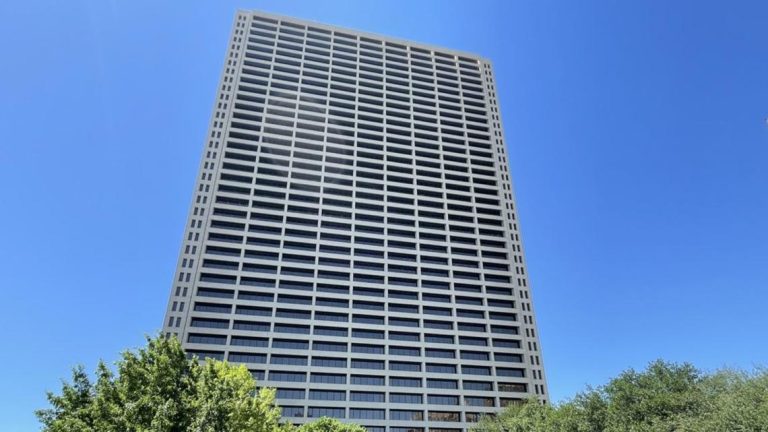The ongoing legal battle means the situation is far from resolved.
FORT WORTH, Texas — Editor’s note: This article originally appeared in Featured in the Dallas Business Journal.
Earlier this month, Pinnacle Bank of Texas foreclosed on one of the loans tied to the office building, taking possession of Fort Worth’s tallest tower, but that’s not the end of the story.
The bank wrested control of Barnett Plaza from Barnett Cherry Street LLC, a company with ties to New York City-based Opal Holdings Inc. The legal battle, now uncovered through court documents and public records, partially explains how the regional bank came to own the 40-story office building.
The ongoing legal battle means the situation is far from resolved.
But the Dallas Business Journal reviewed dozens of pages of documents and interviewed experts to get a better picture of what’s going on at Barnett Plaza, and what emerged was a bitter battle over allegations of fraud surrounding the ground lease.The complicated financial situation has major ramifications for downtown Fort Worth, but it’s not as dire for the market as national headlines following the foreclosure suggested.
Burnett Plaza had been facing financial problems well before its May 7 foreclosure auction. For months it had been plagued by a mountain of lawsuits and liens from contractors who claim they had not been paid for work on the building by Burnett Cherry Street LLC, a company with ties to Opal Holdings.
Barnett Cherry Street LLC and Opal allege in the lawsuit filed April 2 that the loans were forced into default and that Pinnacle is partly responsible for the foreclosure by failing to disburse funds required to pay contractors.
Pinnacle countered in an April 26 legal filing that it began foreclosure proceedings earlier this year because Opal, through the entity that manages the building, had not complied with the financial requirements of the loan.
Pinnacle Bank foreclosed on a $13 million loan for Opal’s Burnet Cherry Street on May 7. The bank won a foreclosure auction for the $12.3 million loan, gaining control of the roughly 1 million-square-foot building that includes tenants such as General Motors Financial and Kimley-Horn.
But the building is worth much more than the $12.3 million bid. A limited liability company with ties to Opal also received a $69.9 million loan from Pinnacle when it bought Burnett Plaza in 2021 for $137.5 million, according to deed documents. Burnett Plaza was assessed for tax purposes at $120.5 million this year by the Tarrant Appraisal District. The building’s current value will ultimately be determined by the market.
Another entity, Barnett Plaza Holdings LLC, is also involved. Barnett Plaza Holdings has taken out ground lease loans totaling $86 million with UMB Bank as trustee, according to deed documents. UMB declined to comment.
Pinnacle alleged in court documents that Barnett Plaza Holdings was affiliated with Barnett Cherry Street and that Opal founding member Shaya Prager engaged in a “drag fraud” by misrepresenting its company’s affiliation with the LLC.
Opal denied Pinnacle’s allegations, saying in legal documents that their contentions were “based solely on Opal’s professed ‘information and belief’ and are manifestly inadequate as a basis for hurling grotesque and damaging accusations.”
Israel Dahan, a partner at King & Spalding who represents Opal, Barnett Cherry Street and Prager, went so far as to say that Opal does not own the building and never has, and that it is owned by Barnett Plaza Holdings LLC.
Jim Scott, an attorney with Kelly Hart & Holman who is representing Pinnacle Bank Texas, declined to comment on the lawsuit.
But Pinnacle’s foreclosure of the small loan means the bank has more control over the building and is acting as a landlord. Pinnacle also holds the first mortgage on the building, said Evan Stone, managing partner at commercial real estate brokerage Goodwin Advisors.
“This is not an uncommon situation,” said Stone, who is not involved with the building. “Other lenders are foreclosing on the mezzanine level. The lenders don’t necessarily have a first lien.”
The downtown Fort Worth office market is relatively healthy with a vacancy rate of 12.4% according to JLL’s first quarter report. By comparison, downtown Dallas’ vacancy rate was 21.6% as of the end of 2023.
It remains a mystery why such a prominent building has fallen into such financial difficulty. In its April 2 lawsuit, Opal claims that Pinnacle Bank caused the bank to default on small loans, “refusal to repay funds required for tenant improvements, and forced the bank to foreclose and litigate against the tower.”
According to the lawsuit, Pinnacle “used its baseless defaults or potential defaults to take over the entire management and operations of Barnett Plaza.”
In its April 26 response, Pinnacle denied the allegations and alleged that Opal had breached its agreements and defaulted on the loans in a variety of ways, including by not meeting required debt-to-equity ratios and allowing liens to be placed on the properties. Pinnacle said Barnett Cherry Street owed more than $75 million on two loans before the foreclosure.
Pinnacle “asserted contractual remedies regarding the loans, including setting default interest rates, accelerating the maturity dates of the loans and demanding payment of the entire unpaid principal balance,” the response said.
Complicating the financial situation is the fact that contractors are suing, claiming they are owed more than $1.6 million for work on Barnett Plaza, including a claim by Tarrant Construction Services, which claimed in a March 5 lawsuit that it is owed $1 million.

